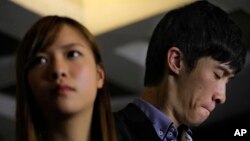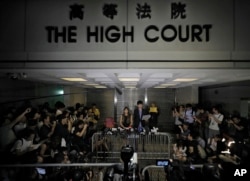China’s unprecedented barring of two election-winning Hong Kong independence activists from becoming lawmakers has drawn a relatively mild expression of disappointment from Washington.
Hong Kong’s High Court disqualified the two legislators-elect, Sixtus Leung Chung-hang and Yau Wai-ching, Tuesday, saying they failed to take a valid oath at a ceremony last month and would not get a second chance. Leung and Yau had altered the wording of the Hong Kong Legislative Council’s oath of office by using a derogatory term for China and displaying a “Hong Kong is not China” banner.
Hong Kong returned to Chinese sovereignty from British colonial rule in 1997 under a constitution guaranteeing it a high degree of autonomy as part of one country with two systems of government.
Days before the Hong Kong court acted against the two independence activists, China’s top legislative body issued a ruling November 7 calling for the disqualification of Hong Kong legislators-elect who do not sincerely swear an oath of allegiance to Beijing.
The National People’s Congress Standing Committee ruling, an interpretation of the Hong Kong constitution, or Basic Law, prompted U.S. State Department spokesman Mark Toner to say the Obama administration is “disappointed by recent developments related to” the Legislative Council (Legco). Toner also urged Chinese and Hong Kong authorities and Hong Kong lawmakers to “refrain from actions that … undermine confidence in the one country, two systems principle.”
Another State Department spokesperson, Elizabeth Trudeau, reacted to the Hong Kong court’s November 15 move by saying Washington was aware of the development and repeating parts of Toner’s earlier statement, but without expressing disappointment or urging anyone to refrain from particular actions.
Familiar ambiguity
The Obama administration’s latest comments about Hong Kong appear to follow a pattern. In recent years, it has expressed concern about Hong Kong’s political disputes and social unrest related to democratic reforms, while also declining to take sides between the Chinese territory’s opposing pro-democracy and pro-Beijing/pro-establishment factions.
Robert Daly, director of the Washington-based Kissinger Institute on China and the United States, told VOA’s China 360 podcast that the Obama administration wants to avoid being once again portrayed by China as manipulating Hong Kong politics. Pro-Beijing media outlets accused Washington of inciting Hong Kong’s 2014 pro-democracy protests and labeled protest leaders as American agents.
“I see the vagueness of the Obama administration’s latest remarks as recognizing the complexity of the situation, and recognizing that Chinese leaders may be acting unwisely but not technically outside of their jurisdiction,” Daly said. “The United States does not want to give Beijing a club with which to beat people in Hong Kong, namely, saying that they are the tools of America.”
Little sympathy
Daly, whose Kissinger Institute is a U.S. government-run research center, said the two disqualified independence activists bear some responsibility for their predicament.
“As someone who has been called on to swear to uphold the U.S. Constitution, I consider that a sacred duty,” Daly said. “I’m highly cognizant of sounding like an old fogey in saying this, but (the actions of Leung and Yau at the Legco swearing-in) were the kind of thing that idealistic, angry younger people tend to do. I think it was legitimate to give them another opportunity to repeat the oath as it was supposed to be administered — a bit of leniency that perhaps would have kept this from blowing out of proportion — but I don’t think that Legco should simply have taken obscenities or insulting oaths at face value. You can’t make light of the oaths or make of them whatever you want to.”
Leung and Yau have expressed no remorse for their actions at the October 12 swearing-in ceremony. They have vowed to appeal their disqualification from Legco to Hong Kong’s Court of Final Appeal.
Asking for trouble?
Richard Bush, a senior fellow at the Brookings Institution in Washington, told VOA China 360 that Leung and Yau used provocative language that risked inviting Beijing to constrain Hong Kong’s autonomy.
“Beijing is interpreting speech as conduct, so talking about Hong Kong independence might be interpreted to be an act in favor of Hong Kong independence and therefore seditious,” Bush said. “So I think this situation is very serious, and that we may be seeing key pillars of the foundation of Hong Kong and 'one country, two systems' being eroded as we speak.”
The head of the Chinese government’s Hong Kong liaison office, Zhang Xiaoming, has defended Beijing’s intervention in the oath-taking controversy as necessary to stop what he called the “endless trouble” that comes with calls for secession.
If Yau and Leung lose their appeal, Hong Kong will have to hold by-elections to fill their vacant Legco seats. Any such elections likely would be held early next year, by which time Hong Kong’s small but increasingly strident independence movement will be an issue for the next U.S. administration of Donald Trump to deal with.





